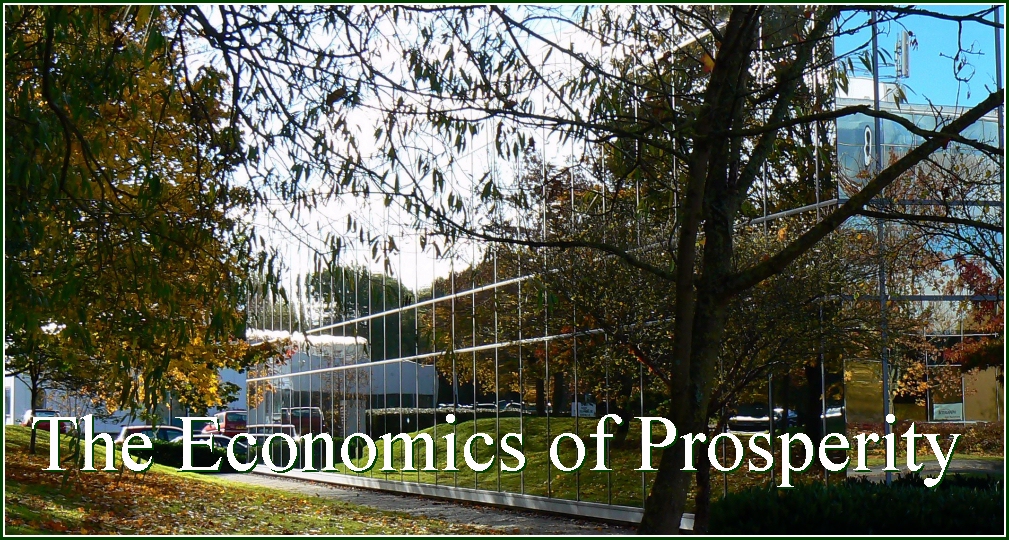
Jobs – Growth – Productivity – Prosperity
The Formula for National Prosperity is very simple: EVERYBODY WORKING – EVERYBODY WORKING PRODUCTIVELY.
If 5% of the working population is unemployed, 5% of productive capacity is wasted. Even if everybody is working, but many are working inefficiently and unproductively due to inadequate investment, then again overall production, and thus output and potential prosperity, will be reduced. We become prosperous, not just by working, but by maximizing productivity.
In today’s economically inter-connected world of competition for excellence in product design using hi-tech machinery and well-equipped modern premises, job-creation requires capital – in sufficient quantity to ensure a business is properly set up, and with guaranteed longterm financial reliability. Adequate, reliable capital becomes even more important when the highest international standards in design, production and marketing must be consistently maintained.
That western banks gambled themselves into massive debts, which in turn required equally massive taxpayer rescue packages plunging governments even deeper in debt, has become a significant episode in banking history. But if we regard the financial and banking system as an element – the most important indeed – of a nation’s infrastructure, it becomes immediately apparent that our current systems fall far short of the needs of a properly functioning economy.
This is a longterm structural problem which goes to the basic, fundamental nature of banks and banking.
EVERYBODY WORKING – EVERYBODY WORKING PRODUCTIVELY
Job-creation requires capital – in sufficient quantity and with guaranteed longterm financial reliability to ensure a business is properly set up, and able to maintain the highest international standards in design, production and marketing. Our current banking system does not provide this.
The fact is simply stated: banks are private institutions whose function is to make money for their directors and shareholders. Serving the needs of the nation’s economy is not their prime concern. In fact quite the contrary. Bankers tend to shrink from involvement in an economy suffering downturn or recession. As bank loans are reduced or refused many a business has found bitter truth in the old saying that ‘banks lend you an umbrella when it’s sunny, and take it away when it rains’.
A network of Regional Investment Agencies with investment capability can spread growth across the nation, creating jobs and providing the wherewithal for existing companies to increase their competitiveness, as well as for infrastructural improvements. Investment targeted regionally can bring industry and growth to traditionally backward areas.
Traditional banking practice requires pre-existing assets as security, and loans carry no long-term commitment. Regional Investment Agencies can avoid these two limitations by securing their loans on the industrial or commercial project itself, thoroughly researched and costed, and by making a long-term commitment based on an intimate involvement with the business or project through on-going monitoring. This facilitates the creation of new business and new jobs, as well as providing secure finance with which existing business can maximize quality and productivity. Regional orientation ensures even development across the nation.
Unlike government grants and incentives, development through repayable investment does not swell the deficits of indebted governments.
By setting up multiple Investment Agencies to operate at regional level, focusing on regional and local needs, the benefits can be spread widely and uniformly, avoiding the usual geographical pockets of non- or under-development. Local infrastructure can also be financed.
Many of today’s successful businesses grew over many years and a long hard climb, starting with minimal capital, operating on a shoestring, and reinvesting every penny of profit. Regional Investment Agencies can provide sufficient capital for a good business venture to start at full operation, properly equipped for maximum productivity.
Indeed, by conditionally requiring the highest standards of product and service quality, Regional Investment Agencies can increase competitiveness, and the high level of productivity which creates real and lasting prosperity.
The Regional Investment Agencies (RIAs) would require minimal initial capitalization, since each project, thoroughly vetted from design to production, management and sales, continuously monitored, together with its fixed assets, becomes the loan collateral.
The RIAs rely for their security on thorough research of loan projects in which they are invested, on expert advice and assistance where necessary, and on a close working and constructive follow-up partnership with the loan recipient, backed by an ongoing flow of performance data.
Thus the business itself, its assets and its ongoing performance, becomes the security. Asset and investment are in balance. Security becomes "equity plus" – equity with the additional security of on-going monitoring.
Is this sound banking practice? Traditional banking practice relies on secure assets to cover its liabilities, but experience from 2008 and forward has shown that the ‘liabilities’ involved in complex hi-tech trading cannot accurately be estimated; and as for banks’ assets, government bonds, once considered as ‘gold-plated’ are now in many cases being seriously downgraded. These changed circumstances call for a fundamental review of both banks’ and governments’ assets. What indeed, is security?
The first major banking crisis of our current century was caused by a combination of banks’ gambling activities and a burst property balloon. Banks were rescued by governments. Though governments were reluctantly compelled to become the bankers of last resort, at least governments were, at that time, relatively sound in their own finances.
The second major banking crisis, following hard on its predecessor and centered on Europe, was caused by the steady downgrading of government debt with an increasing risk of default. European governments talked airily of pumping capital into banks... “to insulate them from default on their government bonds”. No one apparently noticed the glaring contradiction of governments insulating banks from the risk of government default.
Government bonds were once considered the gold-plated assets of banks’ reserves. But with government debts now ranging from unmanageable, through downgrading to ultimate default... Economic Development Agencies, with their loans firmly secured on the assets and ongoing monitoring of thoroughly researched industrial and infrastructural projects, stand out as being a very much sounder prospect. Investment specifically directed into Economic Development is in fact an old-established, well tried, tested and proven concept whose time for revival on a major scale is now more than overdue.
The concept of providing, through whatever financial vehicle, secure finance for commerce, industry and infrastructure is by no means new.
Napoleon III became President and self-styled Emperor of France in December 1852. Industrialization and scientific discovery were already gaining pace in Europe with every indication of continuing potential for growth. This in turn required that banking should promote industry and infrastructure, in contrast to the existing banking system in France which was almost exclusively, and very conservatively managed under Baron James de Rothschild.
Under the direction of the Pereire brothers and the patronage of Napoleon, the newly established Crédit Foncier and Crédit Mobilier financed and promoted investment in the expansion of the textile, chemical, steel and metallurgical industries, and the modernization of agriculture. The rail network was increased from 3,000km in 1852 to 18,000km in 1870, and the complete renovation of Paris between 1853 and 1870 was undertaken by the Seine prefect, Baron Georges-Eugène Haussmann. The addition of further large banks focusing specifically on industry ensured strong economic growth and industrial development.
In 1818 the Swedish government surprised Europe by offering 160,000 Taler to Westphalia as reparation for damages incurred during the Napoleonic Wars. This money was decreed the property of all Westphalia by its President, and the Westphalian Hilfskasse, or Assistance Bank was established to develop the region’s economy and pay for public-works projects.
Impressed by its success, the king of Prussia ordered that a similar bank be created in the Rhineland in 1847. Both banks later became Landesbanken (Regional Banks), and were instrumental in making the Rhine-Westphalia region one of the most productive industrial areas in Europe.
In the post-WW2 years, the Landesbanken again played a major role in the creation of Germany’s Economic Miracle, in particular through the provision of secure on-going finance to the German Mittelstand (small and medium-sized companies) in their respective regions. With 3 million mid-sized businesses the Mittelstand industries now employ more than 70% of German workers and contribute roughly half the country’s GDP.
Founded in Basque Spain in 1956, the Mondragon Cooperative group clearly illustrates an ongoing relationship between investment finance and recipient business. The Workers’ Bank provides development investment, offers technical and financial advice for business startup, then monitors production, quality, and financial performance in a process of ongoing cooperation and partnership.
This also assumes longterm commitment, ensuring finance for secure long-range planning and productivity investment, together with research and development into new-generation products and services in conjunction with apprenticeships and higher education which are also sponsored by the Cooperative. The group now employs 85,000 workers with a turnover of 15 Billion Euros.
The concept of loans based on, and secured by a project itself, backed by continuous monitoring is basic, and simple. It can create jobs, economic expansion and productivity anywhere without increasing government debt.
Regional Investment Agencies can spread growth across the regions, creating jobs and providing the wherewithal for existing companies to increase their competitiveness. And the benefits will stretch into the future as a thriving, broadly based economy sends a positive signal to young people providing the prospect of a challenging, well-paid job as the sure reward of education.
It is the responsibility of government to ensure the proper functioning of the nation’s infrastructure services, among which banking is arguably the most significant. Our current banking system is unstable, irresponsible, and serves the interests of its shareholders, not those of the nation. We need to change it, and urgently.
Everybody working, everybody working productively. This requires serious, longterm financial commitment. During the Great Depression years following 1929, Lord Melchett was one of several prominent proponents of financial reform. He stressed that banking should be at the service of industry, rather than industry at the mercy of the banking system. His words are equally true today:
“While banks take a short-term view for reasons of security and liquidity, business is conducted on a long view. We must alter our banking and economic system to suit the necessities of industry”.
The Formula for National Prosperity is very simple:
Dedicated, Project-secured Development Investment can make it happen.
and Painless Debt Reduction
ONE: Project-Secured Investment through Regional Investment Agencies
TWO: Millionaires and Unemployment – A Fair Day’s Pay.
THREE: Better Government – less cost

there’s more |



